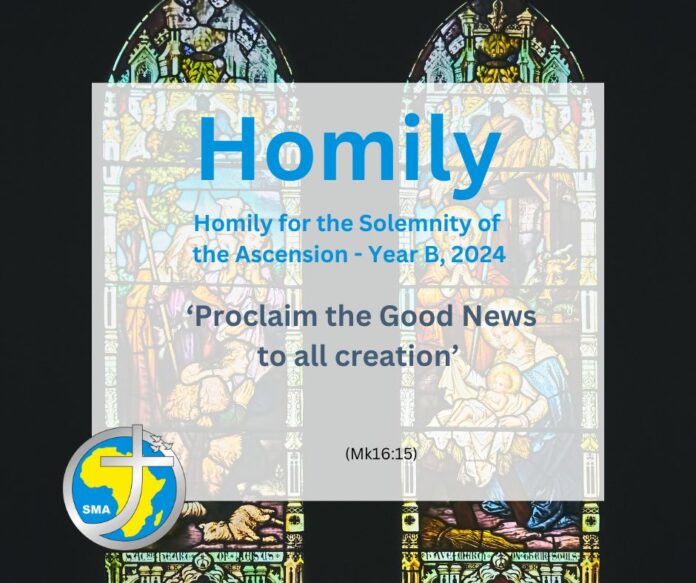Readings: Acts 1:1-11; Ephesians 1:17-23; Mark 28:16-20
Theme: ‘Proclaim the Good News to all creation’ (Mk16:15)
Today, the feast of the Ascension, marks both an end and a beginning: the end or completion of Jesus’ mission on earth and his return to the Father to reign as Lord of all creation; the beginning of the mission of the Church, empowered by the gift of the Spirit. Our readings today offer us two accounts of the Ascension: the first from the Acts of the Apostles, written by Luke; the second from the Gospel of Mark. Both versions teach us important truths of our Christian faith.
In our first reading, Luke tells us that Jesus ‘was lifted up, while they [the disciples] looked on, and a cloud took him from their sight’ (Acts 1:9). Taken literally, Luke’s words might give us the impression that Jesus executed a kind of vertical take-off into some remote region of the cosmos beyond the clouds, a place we think of as heaven. A visit to the Chapel of the Ascension on the Mount of Olives would seem to confirm this impression. Located on a site traditionally believed to be the place where Jesus ascended into heaven after his Resurrection, this chapel contains a slab of stone featuring one of Jesus’ footprints as he rose into the clouds! While a relic like this may remind us of the physical presence of Jesus on this earth, it doesn’t really help us to grasp the meaning of the event we are celebrating today.
The ascension of Jesus into heaven is not some mind-boggling physical feat never seen in the history of human endeavour; it is the mystery of Jesus’ return to the Father. As the noted scripture scholar, Tom Wright, explains, what the ascension means is that ‘Jesus has gone ahead of us into God’s new world, and is already ruling this present world as its Lord, and also interceding for us at the Fathers’ right hand’. In our second reading, Paul tells us that God ‘has put all things under his [Jesus’] feet and made him, as the ruler of everything, the head of the Church, which is his body, the fullness of him who fills the whole creation’ (Eph 1:22-23). Our gospel reading from Mark conveys the same message, stating that Jesus ‘was taken up into heaven’ and ‘there at the right hand of God he took his place’ (Mk16:19). We sometimes speak of the ‘right hand man’ of a powerful ruler. Jesus is God’s ‘right hand man’, occupying a position of supreme power and authority.
Today’s gospel tells us that the final command of Jesus to the eleven apostles before he returns to his Father, is to ‘go out to the whole world; proclaim the Good News to all creation (Mk 16:15). Mark underlines the universality of this commission. Jesus wants the gospel to be proclaimed to everyone, everywhere. During his earthly life, his proclamation of the Kingdom of God was limited primarily to the Jews. Now the boundaries of his mission are expanded to include all humanity, and extend to all creation. We think of Giotto’s famous painting of St Francis preaching to the birds. All creatures great and small are embraced by the gospel of God’s love.
Mark also reminds us that Good News does not compel acceptance. Those who hear it have the choice either to believe or not to believe. And those who believe shall be confirmed in their faith by means of signs. In the name of Jesus, ‘they will cast out devils; they will have the gift of tongues……; they will lay hands on the sick who will recover (Mk 16: 17-18). In other words believers share in the power of their risen and glorified Lord. The gospel reading ends with the assurance that, as the apostles embarked on their missionary mandate, ‘preaching everywhere’, the Lord was ‘working with them and confirming the word by the signs that accompanied it’ (Mk 16: 20). Jesus’ ascent to heaven does not mean that he is totally absent from our world. On the contrary, he is now present in a new way, working, in and through his Spirit, with his disciples to heal and transform our broken world, imbuing it with the fragrance of heaven.
Like the eleven apostles, all of us, by virtue of our baptism, are called and empowered to go out and proclaim, in word in deed, the Good News to all creation The task may seem beyond our strength as the forces that resist us are truly daunting. But we shall not be overwhelmed for we are never alone. Jesus continues to work with us through his Spirit, drawing us and all creation to its final destiny in him.
For our communion reflection, here is a short poem by Malcolm Guite, entitled Ascension, which draws us into the meaning of today’s feast with words that resonate in the heart.
We saw his light break through the cloud of glory
Whilst we were rooted still in time and place
As earth became a part of Heaven’s story
And heaven opened to his human face.
We saw him go and yet we were not parted
He took us with him to the heart of things
The heart that broke for all the broken-hearted
Is whole and Heaven-centred now, and sings,
Sings in the strength that rises out of weakness,
Sings through the clouds that veil him from our sight,
Whilst we our selves become his clouds of witness
And sing the waning darkness into light,
His light in us, and ours in him concealed,
Which all creation waits to see revealed.
Michael McCabe SMA
This we week also publish an Ascension Reflection by Fr Kevin O’Gorman SMA (from 3pm 11 May) – accessible via the home page news.
Click on the play button below to listen to an alternative homily from Fr Tom Casey SMA.
|
|

